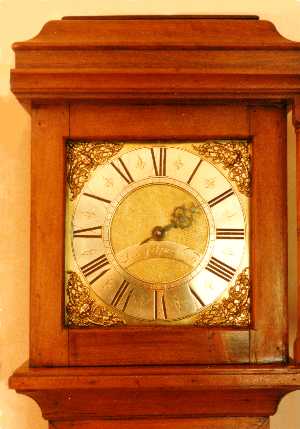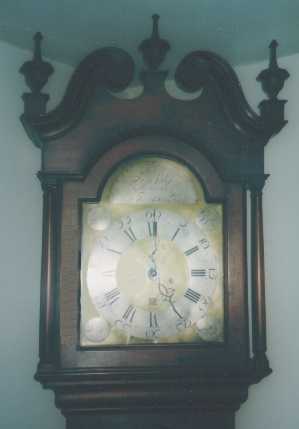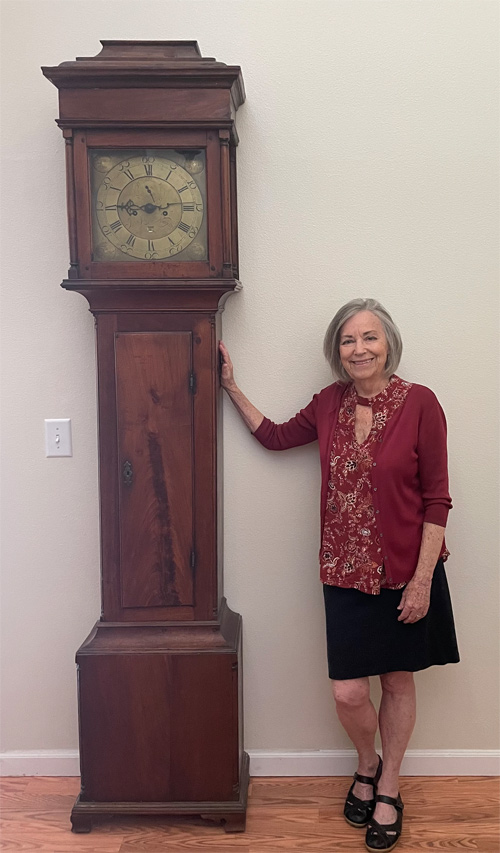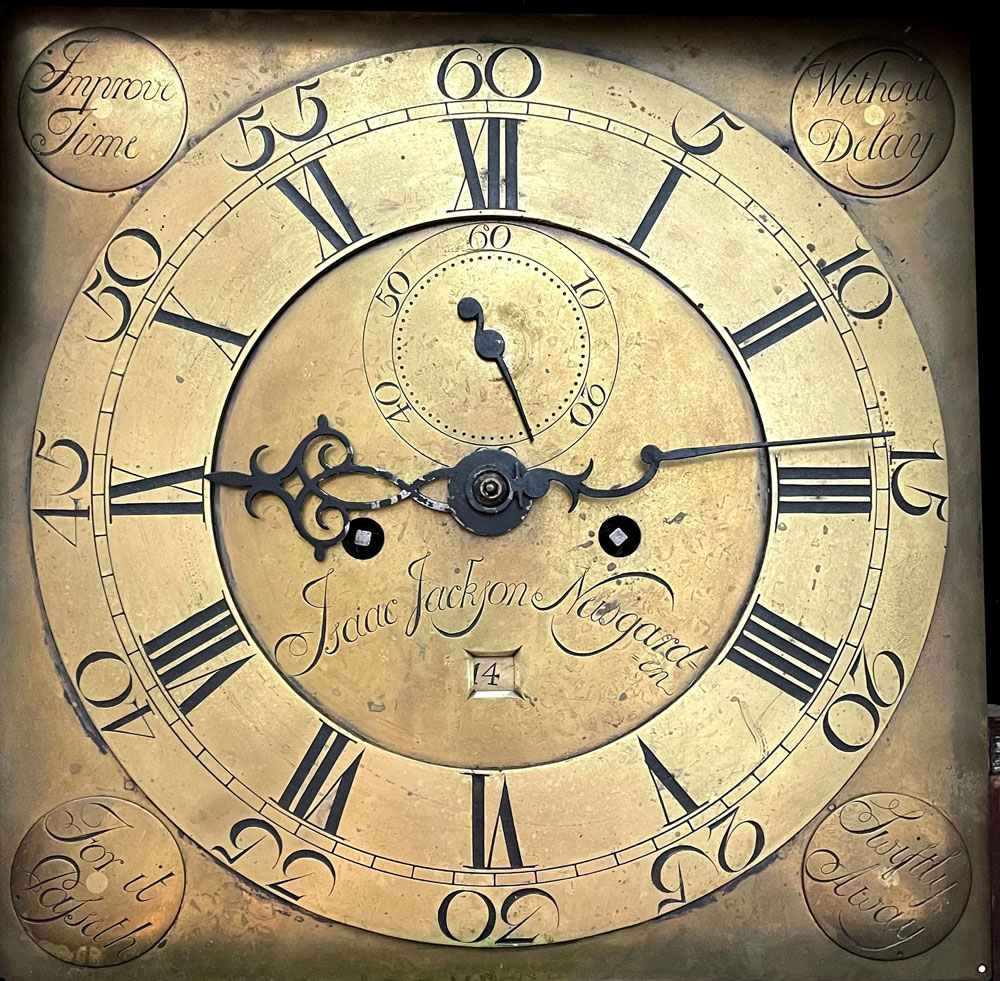

Thirty Hour - One Handed Clock
Eight Day - Two Handed Clock


by Margaret B.Jones, PhD
Clockmaker, Isaac Jackson, had roots in New Garden Township even before he was born. His father’s sister, Rebecca, was married to Jeremiah Starr and his mother, Katherine Miller Jackson was the daughter of James Miller whose farm lay on New Garden Road West. However, in 1734, Isaac Jackson was born at Harmony Grove, the Jackson homestead east of West Grove. Young Isaac grew up in a family of craftsmen; his father, William Jackson, and his grandfather, Isaac Jackson, were both weavers. This was not unusual in Colonial America where farmers frequently pursued a craft during winter months.
When Isaac was a young teenager, he was apprenticed to John Wood, Sr., considered one of the most accomplished of the Philadelphia clockmakers. Then in about 1755, having acquired the skills of his trade, Isaac was bound over as a trained journeyman to Quaker clockmaker, Benjamin Chandlee, Jr. of Nottingham. After spending two years honing his skills in the Chandlee workshop, Isaac returned home to Harmony Grove where he continued to make clocks. These years of Isaac’s life can be verified because with each move, he transferred his Friends Meeting membership, from New Garden to Nottingham and then back to New Garden.
In 1762, Isaac married a distant cousin, Hannah Jackson, and moved to the 200-acre farm his father purchased for them in in New Garden Township. Today, the New Garden Elementary School sits in the middle of Isaac Jackson’s land and south of the school, the white farmhouse is Isaac’s house, now doubled in size.
When Isaac and Hannah built their brick house, it contained only four rooms, two up and two down, and here they reared eleven children to adulthood. Because no workshop appears as an outbuilding on Isaac’s early tax records, initially, he was probably making clocks in an upstairs room. He needed a fireplace in which to heat metal; we know he worked in brass, in pewter, and in silver. The works of his clocks were brass and the dials were often of brass with silverplating. Not only did Isaac Jackson make clockworks, but as a consummate craftsman, he also made most of his own tools. And there must have been a market for pewter porringers because his probate inventory lists twenty pewter porringers. For many years, according to one of his grandsons, a pewter porringer hung by the pump at Harmony Grove.
Although Isaac Jackson was a clockmaker, he was a cabinetmaker as well who used walnut for the cases of his tall clocks. His early clock cases are all similar in design and reflect his belief in simplicity as well as the conviction of simplicity of his clients. Most of Jackson’s clocks were sold either to his Quaker neighbors or to other members of the Society of Friends. We don’t know why, but perhaps because making the clock works was more interesting or more lucrative, Jackson eventually engaged other cabinetmakers to construct his clock cases. This would account for the more elaborate cases on some of his later clocks.
Three surviving early Jackson clocks have only one hand, showing the influence of his training with John Wood, Sr. These one-hand clocks, unique in Chester County, have only thirty-hour movements, meaning they will only run for thirty hours after being wound. The remainder of the known Jackson clocks have eight-day movements which need winding only once a week. Isaac Jackson signed the faces of his clocks, “Isaac Jackson, New Garden,” but sometimes, due to lack of space, “Isc Jackson” or “New Gar.” Frequently, he inscribed small silver moons in the corners of the clockface with “Time Passeth Swiftly Away,” one word per corner.
We may never know how many clocks Isaac Jackson made; with so many house fires in the 18th and 19th centuries, many of his clocks were probably lost. In his 1947 book entitled “Chester County Clocks,” Arthur James listed twenty-seven known clocks, however, in the intervening years more have been discovered. Recently the Historical Commission has responded to two different inquiries as to the provenance of Jackson clocks. And it is also unlikely that Arthur James was aware of the Jackson clock with Miller provenance, now belonging to New Garden Township. This clock, secured by the Historical Commission with support from individual donors and the Board of Supervisors, will commemorate the life of our remarkable 18th century resident.
Some have speculated that active farming may have been difficult for Isaac Jackson. He suffered from a twisted or club foot which could have made him more a clockmaker than a farmer. In any event, his surviving clocks are much more numerous than those of most clockmakers of the period; most of whom have only two or three surviving clocks. And not only do more of Isaac Jackson’s clocks survive, but according to Edward LaFond, who for many years cared for the collection of Chester County clocks at the Historical Society, Jackson’s clocks are superior to any others in the collection.
During the years 1774-1780, Isaac Jackson had an apprentice and then partner in Elisha Kirk. Although the two men would have collaborated on clocks, the clocks they made would all have carried Isaac Jackson’s name. Isaac Jackson and Elisha Kirk might have been busy in the workshop on the afternoon of September 9, 1775 when the British and Hessian soldiers, pillaging as they went, marched along the road through the Jackson farm. Apparently, Jackson did not suffer any grievous damage because his name did not appear on a 1777 New Garden Meeting list of those who needed assistance.
Isaac Jackson’s interests extended well beyond the confines of his clockmaking workshop. Writing in 1885, Joseph Lewis, said his grandfather, Isaac Jackson was noted in his day for his efforts on behalf of the people of color. He was an active abolitionist. Because he lived near the Maryland line, he was frequently called upon when former slaves were captured on false pretenses. Often on these occasions, he and his friend, Jacob Lindley, were successful in their efforts. However, they were often involved in considerable danger because the claimants were generally vindictive and often desperate. Lewis also wrote that for many years, the Jackson home was a refuge for those escaping slavery; any fugitive could be assured of safety and of assistance.
Beginning in 1758, in conjunction with John Woolman, Jacob Lindley, and others, Isaac Jackson undertook to convince the Philadelphia Yearly Meeting of Friends to take steps to emancipate all slaves held by members of the Society of Friends. In this effort, Isaac Jackson personally visited the Quaker owners of more than 1100 slaves and reported that a great number of persons visited agreed to take steps to free their slaves. These labors to abolish slave holding within the Society of Friends were successful. In 1776, the Yearly Meeting directed all Friends Meetings to deny the right of membership to any persons who persisted in holding slaves.
Isaac Jackson was a literate man whose library contained many works of early Quakers: George Fox’s Journal, Robert Barclay’s Apology, John Woolman’s Journal, as well as a Bible and Concordance. An active Quaker, he made many trips to Philadelphia where in the early 1780’s, he was named Clerk of Philadelphia Yearly Meeting. This appointment, was an honor which acknowledged his commitment to Quaker thought and concerns.
Joseph Lewis went on to write that his grandfather’s hospitality was generous. He built a stable separate from his farm buildings, to accommodate his visitors’ horses and no man of any note visited the neighborhood who was not a guest at his table.
Isaac Jackson died in 1807 and was buried in the New Garden Friends cemetery. And so, we celebrate the life of the man, who by all accounts, was Chester County’s premier 18th century clockmaker. He was a man who balanced his life with a commitment to his Quaker belief of simplicity in all things, a belief in the dignity of his fellow men, and a concern for the social welfare of his community.
|
|
Thirty Hour - One Handed Clock |
Eight Day - Two Handed Clock |
|
|
Patricia Harlan McClure of Beaverton, Oregon sent us a photo of her family's Isaac Jackson clock. It is thought to have been purchased by her great-great-great-great-grandfather David Harlan Sr who lived five miles from Isaac Jackson in London Grove Township in the mid 1700s. Over its 250 years it has become a well travelled clock having chimed day and night for seven generations of the family in houses in London Grove Twp, Hartford MD, Bel Aire MD, Cleveland OH, southern California, and now Oregon.


Inscription: "Improve Time Without Delay, For it Passeth Swiftly Away, Isaac Jackson, Newgarden"